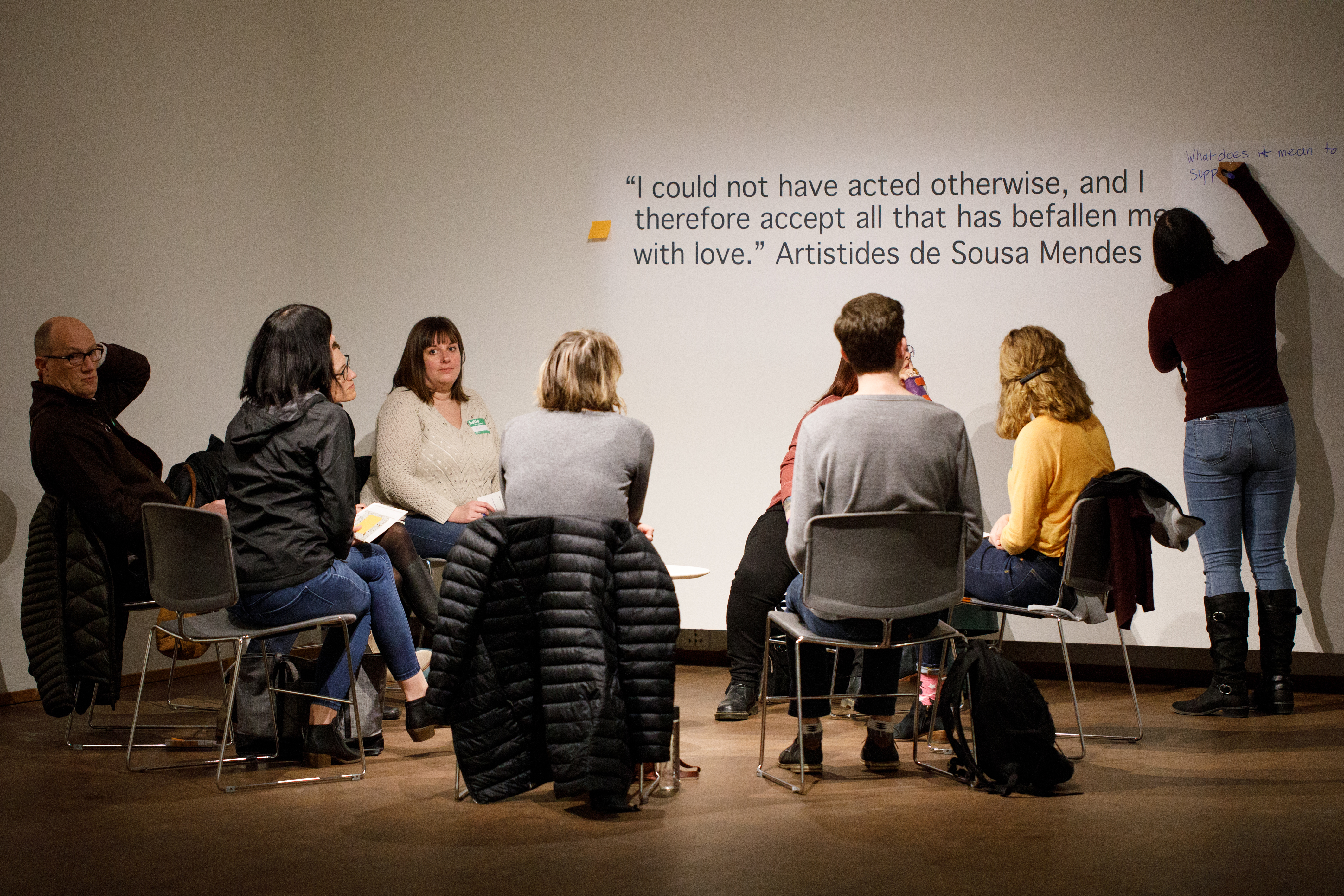One of the four discussion groups that moved to separate areas of the Western Gallery to discuss the question in the title of the event “What Does it Mean To Support Refugees?” Joe Addison // AS Review
By Jack Taylor
Activism can start at home. That was the main message from Western’s Teaching-Learning Academy and the Western Gallery’s “What does it mean to Support Refugees” panel. The discussions ranged from how to support refugees on a local level in addition to staying aware of what is happening on a national level.
On Oct. 30 in the Western Gallery, students and residents of Bellingham heard from New York Times Bestselling Author Alan Gratz as well as teachers, faculty and students of Western.
Nathan Rolond, who organized the event, spoke about the goal of the panel as part of the Teaching-Learning Academy.
“The Teaching-Learning Academy, or TLA, facilitates dialogue around topics encouraging others to take action in their own lives,” Rolond said.
Also speaking on the panel was Imayasil Lopez Abreu, a Western student and Cuban refugee, who spoke first hand about the struggles refugees face. Having arrived in the United States in 2013, Abreu spoke about how she initially knew little English and how it was difficult to adapt to a new country.
“I just wanna say that the struggles are constant regardless of the year, or two, or three or six that you are in the country,” Abreu said. “It doesn’t change the way people look at you and treat you, and the way you feel different.”
One of the hardships Abreu encountered was asking for help.
“It’s hard to ask for help, it’s hard to say I need money, it’s hard to say that I don’t have food for my son. That’s hard to say,” Abreu said. “It’s tough for a kid to lead a refugee family that doesn’t have enough money to buy clothes and books.”
Since enrolling in Western, Abreu said that achieving a degree will help others to view her differently.

“To have a degree, is not only validating knowledge and placing you in the workforce, but I think it gives you dignity and respect,” Abreu said.
Outside of talking about their backstories, the panelists also discussed the importance of Alan Gratz’s 2016 book “Refugee.” Focusing on three refugees from differing backgrounds: Jewish, Cuban and Syrian, Gratz believes there is a connection between all of them regardless of the differences in culture and time.
“You can see the parallels in their lives and in the end you can see how each of these three families is actually connected from across the thousands of miles and decades that separate them,” Gratz said. “And they are connected and we are all connected and that’s part of the bigger message of this book, is that we are all human beings, and that refugees don’t have one face.”
Fellow panelist Desiree Ceuto, an assistant professor of elementary education at Woodring College, spoke about the power of Gratz’s book informing middle schoolers about such intense topics.
“While the events and characters of each of the stories are based on historical fact, the power of the book moderates the recurring topics, themes and extended metaphors that bind each of the stories together to remind us, the readers, that until we find the courage to stand up and push back … we are doomed to repeat history,” Cueto said.
Rather than focus on a singular family, Gratz talked about how vacationing in Florida with his family and seeing a raft left on the shore with empty water bottles and empty food containers caused him and his family to reflect on the extremes people will go to in order to achieve a better life.
That experience inspired him to write about more than just one refugee experience.
“My family and I, we were stunned by this, we walked around it [the abandoned raft] and talked about it and it made us think of all the stuff we take for granted,” Gratz said.
After all the panelists spoke, the audience was divided into different groups to discuss different ways that everyday people can help refugees.
Western Student Michael Nguyen, spoke about what made him want to partake in the discussion.
“We spoke about refugees today and how we can support refugees,” Nguyen said. “One, my parents are refugees from Vietnam originally so that’s a personal tie, and another as a millennial, I kinda take a step back and look at all the current affairs in the world and I truly want to learn the best about how I can help my fellow neighbor.”
Nguyen said he learned how helping can come in many forms.
“What we learned today was that it can be as small as helping your friends or family or even colleagues who are refugees figure out how America works,” Nguyen said.
More information on the Teaching-Learning Center and its upcoming events can be found on its website.

